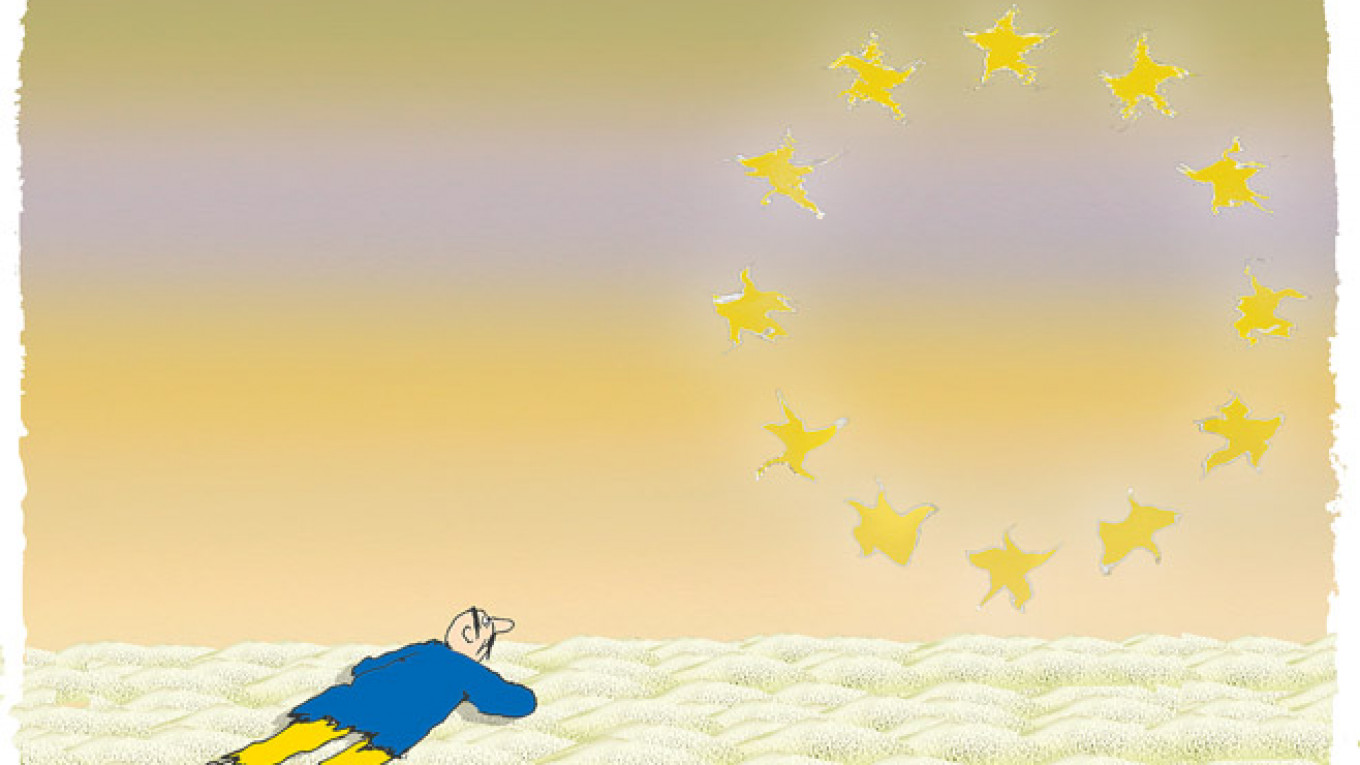Between Russia's annexation of Crimea, a potential invasion of the Donbass and an economic implosion that is only gathering pace, Ukraine has had a pretty rough time over the past six months. Despite all of these problems, the media narrative is of a country that is increasingly united around support for a "European path." Many Ukrainians, including the new political leadership, strongly believe that integration with the European Union is the surest cure for the country's ills, particularly its economic ones.
Assurances from Ukrainian leaders that EU integration will bring prosperity will lead to anger when reality fails to match rhetoric.
The idea of European integration rapidly bringing economic prosperity is not simply the invention of Ukrainians. It is something that has been repeatedly and publicly reinforced by prominent politicians such as Swedish Foreign Minister Carl Bildt and Stefan Füle, the European commissioner for enlargement and European Neighborhood Policy.
According to the standard narrative, after some form of European integration, Ukraine would cut wasteful subsidies, bring its institutions up to par, lower barriers to trade and adopt EU health and safety standards. Having done so and having gained unrestricted access to the world's largest single consumer market, Ukraine would experience a boom in light industry and a sharp spurt of economic growth that would place it on a path to eventual convergence with the West.
While certain Eastern European countries — particularly Poland and Slovakia — have made impressively rapid economic progress over the past two decades, two recent entrants to the EU — Bulgaria and Romania in 2007 — have performed much worse. After many years of reform, per capita incomes in these countries are still less than 40 percent of Western European averages. Even more alarming, these three countries have almost entirely stopped converging with the "old" EU members in the West.
Support for economic reform and European integration is actually much weaker in Ukraine than it was in the most recent EU entrants. A poll conducted from March 14 to 26 by Baltic Surveys and The Gallup Organization on behalf of the Washington-based International Republican Institute among 1,200 permanent residents of Ukraine showed that, despite the near unanimity of its political elite, Ukraine is characterized by stark regional differences. In western Ukraine, 66 percent of respondents were willing to suffer short-term economic harm in exchange for better long-term growth. In the eastern regions of Ukraine, however, only 17 percent were willing to do so. Similarly, a large majority of residents in western Ukraine supported eventual EU membership, while in eastern Ukraine support for the EU remains as low as 20 percent.
Given the uncertain economic track record of recent EU entrants and Ukraine's own critical situation, the emphasis from the new government in Kiev should not be on "convergence" with the West. A rapidly growing Ukraine would be nice, but it isn't going to happen. Public assurances from authorities that it will happen will only lead to second guessing and recrimination when reality inevitably fails to match the rhetoric.
All is not lost, though. A focus on legal and institutional reform, an effort to make Ukraine's political system more open, transparent and democratic can have an immediate impact. There is a genuine consensus in Ukrainian society that corruption should be fought and that citizens should have a more active say in how they are governed.
And it is exactly in the area of political reform — reducing corruption, improving rule of law and building democratic institutions — that the EU has the clearest track record of success. All countries that went through the EU accession process saw their democratic institutions significantly strengthened while also experiencing tangible reductions in corruption.
Experience throughout Eastern Europe has shown that extremist and populist parties thrive when authorities in power make exaggerated promises that they know they will never be able to keep. Exaggerating the economic benefits of joining the EU could very easily set up Ukraine for even greater political instability and public discontent in the future.
Rather than tout economic benefits that are likely to be nonexistent or underwhelming, Ukrainian and European politicians should highlight the possibilities of political, legal and institutional reforms. This is a sort of back-to-basics approach in which the EU focuses on what it does best — building democratic institutions — while shying away from what it is not very good at — forcing countries to institute economic reforms.
If Ukrainians still desire integration under these conditions, it will be a story of successful engagement rather than one of disappointment fueled by false promises.
Mark Adomanis works as a consultant in Washington and writes about Russian politics, economics and demographics. Luka Oreskovic is an associate fellow at Harvard University where he co-chairs a seminar on business and government in emerging Europe.
A Message from The Moscow Times:
Dear readers,
We are facing unprecedented challenges. Russia's Prosecutor General's Office has designated The Moscow Times as an "undesirable" organization, criminalizing our work and putting our staff at risk of prosecution. This follows our earlier unjust labeling as a "foreign agent."
These actions are direct attempts to silence independent journalism in Russia. The authorities claim our work "discredits the decisions of the Russian leadership." We see things differently: we strive to provide accurate, unbiased reporting on Russia.
We, the journalists of The Moscow Times, refuse to be silenced. But to continue our work, we need your help.
Your support, no matter how small, makes a world of difference. If you can, please support us monthly starting from just $2. It's quick to set up, and every contribution makes a significant impact.
By supporting The Moscow Times, you're defending open, independent journalism in the face of repression. Thank you for standing with us.
Remind me later.






